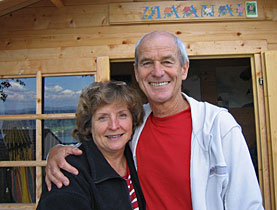DNA dating site promises better sex

If the thought of sweaty t-shirts turns you right off then you could be making one of the biggest mistakes of your life, according to a new dating website.
The online matchmaking service promises to increase chances of better sex, fertility and lasting relationships with less risk of cheating. The bold claims are based on a Bern scientist’s odour attraction research.
ScientificMatch.com joined a growing legion of internet dating sites when it launched in December last year. But this matchmaking venture comes with a twist – couples are put together based on the incompatibility of their immune systems.
Research has found that couples with different immune systems find each other more attractive. This is nature’s way of ensuring that their children have a varied immune system.
One such study conducted a decade ago by Claus Wedekind, then a researcher at Bern University, asked people to sniff three-day-old t-shirts and rate the sexiness of the body odour.
He found that people emit a different odour according to the make up of their immune system. In short, owners of particularly sexy t-shirt smells had different immune systems from the love-struck sniffers.
Eric Holzle, a confirmed bachelor with dual Swiss and United States citizenship, believes this represents the future of successful human relationships. So much so, that he set up a dating website to prove it.
Test tube love
ScientificMatch.com clients send cheek swabs, along with $1,995 (SFr2,200), to the Boston-based enterprise for DNA analysis that checks immune system compatibility.
“People in the high end of the market, who are willing to pay a lot of money, are the type of people who are looking for serious long-term relationships. Casual daters don’t have a big interest in paying to finance their one-off encounters,” Holzle told swissinfo.
However, in the interests of old fashioned romance, clients also complete a personality test and meet each other to see if there is a spark. DNA testing is just one piece of the puzzle, said Holzle.
“We are not creating love in a test tube. Romance still has to be struck one-on-one and the relationship has to evolve naturally,” he said.
It is still early days for the website, and the process takes time, so Holzle has not witnessed any weddings just yet. But he is convinced that genetic dating is here to stay.
“I can’t imagine a future when someone, who is thinking of settling down and starting a family, does not take the opportunity of not only finding someone who smells nicer but who will increase their chances of having a more satisfying sex life, someone with whom they will be more fertile and have a healthier family,” he said.
Knowledge gaps
The website’s claims are, indeed, based on solid scientific research, according to Wedekind. However, he is reserving final judgement until more facts are known.
In particular, nobody knows just how different immune systems must be to find an optimum match. And it is unclear how important the selection process, designed to stop inbreeding, still is in modern society.
“It is still relevant is some isolated Swiss valleys where families have lived together for generations. But in large cities maybe we are talking about a mechanism that does not have much meaning,” he told swissinfo.
“But if this website does help people to lead a happy life then I would be proud to have contributed.”
swissinfo, Matthew Allen
Claus Wedekind’s studies focused on genes that play an integral role in a part of the immune system known as the major histocompatibility complex (MHC).
It had already been established in mice that MHC also played a role in sexual attraction by releasing odours. His sweaty t-shirt experiment determined the same link in human MHC.
Wedekind recruited female volunteers to smell three-day-old men’s t-shirts and rate the most attractive.
After then analysing the DNA of both the men and women he found a clear correlation between odour attractiveness and differences in MHC.

In compliance with the JTI standards
More: SWI swissinfo.ch certified by the Journalism Trust Initiative




You can find an overview of ongoing debates with our journalists here . Please join us!
If you want to start a conversation about a topic raised in this article or want to report factual errors, email us at english@swissinfo.ch.